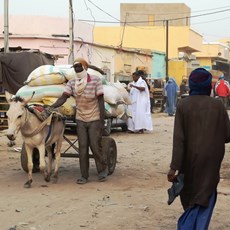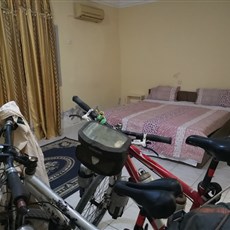But that’s the wonderful thing about foreign travel, suddenly you are five years old again. You can’t read anything, you have only the most basic sense of how things work, you can’t even reliably cross the street without endangering your life. Your whole existence becomes a series of interesting guesses. - Bill Bryson
13 February 2020, Ndiongo, SENEGAL to Rosso, MAURITANIA, 68.7km
Hotel Chemama UM1,300 (R520)
Exchange rate: Rand 1 (R): Mauritanian Ouguiya 2.50 (UM)
What a horrible day! A horrible way to end a pleasant stay in Senegal and a horrible introduction to Mauritania.
The first 15km to the very unattractive town of Ross Bethio were just fine, with our good flat road continuing, and little wind. We breakfasted in Ross Bethio on baguettes stuffed with two unknowns: a small deep-fried doughy something, and a dark spicy saucy something. Tasty and filling.
And then, just leaving town, the wind came up and blew for 50km to Rosso, Senegal. (The town across the river on the Mauritanian side of the border is also called Rosso.) Had it not come up, we may have averaged at least 18kph. Had it been behind us, we might have averaged 22kph. With it either in our faces or blowing in from the right, we were slow. Essentially it forced us into a mid-range gear in which we worked hard enough to climb a hill … for several hours. Two punctures did not help reduce the hours spent on the road. We changed the one, but Charl’s front went flat on the outskirts of Rosso and he elected to walk to the auberge we had seen marked on Google Maps.
Border towns are always a little hyper, with people selling goods to motorists and pedestrians, with trucks parked in the streets, with money changers touting for business, with the unknowns of where to get stamped out or have your health docs checked or be recorded in one or more hand-written log books.
The Rosso border crossing, on the Mauritanian side, is notorious. It is known for scams, corruption and bribe requests. Stories and warnings from unhappy travellers appear on iOverlander, the Lonely Planet Forum and other sites on the web. Forewarned, we thought, is forearmed. Huh… We were scammed, not only on the Mauritanian side of the Senegal River, but on the south bank too. Such fools…
We had thought to arrive in Rosso, Senegal mid-afternoon, to book into an auberge, and to get our bearings before taking the ferry in a calm and prepared state the following morning. Getting our bearings essentially meant exchanging our cash and finding out about ferry times and prices. When we limped into town around 15:30, hot, tired and punctured, it was to find that the only auberge in town was full. This meant changing money and getting on the ferry in a less “calm and prepared state” than hoped.
Throughout Africa we have changed cash at and between borders on many occasions. Each time, we have done our sums in advance, and have been pleased to find that all money changers have given us rates within a reasonable range, in other words, we have found them to be universally honest. It seems, however, that the corruption of Rosso, Mauritania, has taken a ferry to Rosso, Senegal. One never has to hunt for a money-changer at a border crossing; he will find you. We had rejected several offers to exchange money while we searched out the auberge. Having … er … decided to cross to Mauritania, we got ourselves stamped out of Senegal by the police and this time accepted the services of a money-changer who approached us. We should have been put off by the several men who accompanied us and him to his office, shouting at each other, we assumed over whether one of the others had approached us earlier. Noise and jostling create a climate of uncertainty and a distraction, and are inevitably a sign of a scam in the making. For some reason, this is a lesson I have been slow to learn. Perhaps because I have seldom been scammed, perhaps because I tend to assume honesty, perhaps I am slow to learn!
We needed both Euro, with which to purchase our visas, and Mauritanian Ouguiya. The changer asked more or less what we expected for the 110 Euros we needed, lulling us into our comfort-zone. Then he offered to pay us in Ouguiya more than we expected for our remaining West African Francs. Or so we thought. Two things conspired to help him essentially rob us of R700. The Mauritanians say and write 12,000 when the notes that represent this amount read 1,200. This we did not know. When he typed 12,000 into his calculator, we were confused and began to try to calculate why when we thought we should get only around 3,000. While we were still dithering, he took our Francs, slipped 1,200 Ouguiya onto the counter and eeled by us and out the door. Next thing we knew, we were being aggressively hustled out by one of the several men still arguing in the doorway. And so we were duped … QED.
But the money-changer was a rank amateur compared to the scamsters on the Mauritanian side of the river who “robbed” us of R2,000. (Is it theft if you hand over the money voluntarily? If duped, yep…)
We took the short ferry ride across the river, wheeled our bikes to the immigration office, and there bought our visas and got stamped into Mauritania. It was near the port exit, at around 17:30 after a long tiring day, that we were asked to show our passports to an official, who wanted photocopies. And there that we picked up company. Again, several men with loud voices. This time each making different demands, some linked to threats to send us back to Senegal if we did not comply. One took our passports from us to have them copied; being separated from your passport is anxiety-producing. One demanded payment for the ferry, which we had been told was free. One argued that we had to pay a fee for the bikes. One said we needed some sort of proof from our bank of available funds. Of course, particularly after the fact, it is easy to see that we should at this point just have walked away. And it is disturbing afterwards to wonder what in our psyches prevented us from doing so. Fear of authority? A throwback to childhood? A natural politeness? Confusion over language, though most spoke English? I was largely to blame. Charl was willing to be obnoxious and argue, I was anxious about the threats (in retrospect, such nonsense). Once they managed to sow seeds of of discourse between Charl and I, they also managed to separate us, and that was the beginning of the end.
I was taken to a nearby bank and told I had to draw 8,000 Ouguiya for each of us to prove we had funds, and to get a slip for the officials. I thought, “Well, we need to draw cash anyway, so why not?” But then I had cash in my hand. Back at the port, where Charl was watching the bikes, I was surrounded by men. This one demanding the slips, that one money for the ferry, another the cash for registration of the bikes, and so on. Somehow in the melee I relinquished all 16,000 into the hands of an official, who returned only R11,000 to me instead of the promised full amount. “For the bikes”, I was told. The problem was, given the confusion during the money change in Senegal, I still had no idea what the currency exchange was, nor therefore how much they had in fact kept. [It was only over dinner that we calculated it could be as much as R2,000, and only the following day, after buying SIMs and data that we could be sure this was in fact the case.]
We finally left the port feeling battered and insecure and extraordinarily stupid. We took a little time to fix Charl’s flat, then cycled north of town to the Chemama advertised on iOverlander. Expensive by African standards, but nice staff and dinner available on site.
A thoroughly disheartening day…
For today's route see below photos
For overview route, click on ROUTE tab above…

Rosso

Hotel Chemama, Rosso